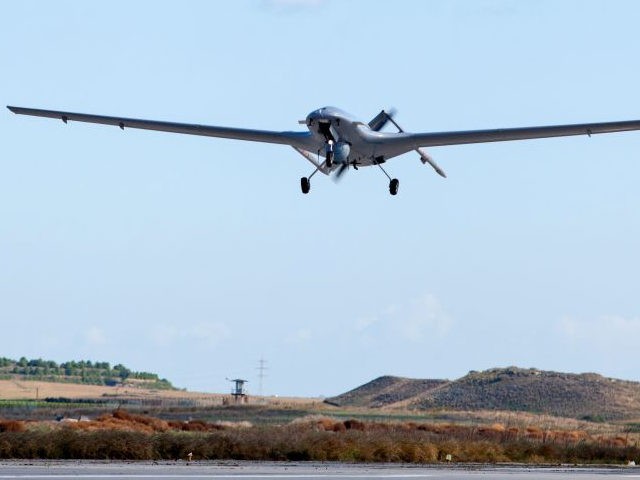Baykar Defense, the Turkish company that manufactures the Bayraktar drones used to deadly effect by Ukraine’s defenders against the invading Russian army, on Tuesday, anticipated booming sales across Asia for its already sizzling-hot weapon system.
CEO Haluk Bayraktar thought the sales boost from success in Ukraine would be big enough to undercut China’s proliferation of drones throughout the region.
“China will not be willing to sell drones to many Asian countries in its neighborhood, and we are providing those countries a better option. They are showing much interest,” Bayraktar boasted to Nikkei Asia.
Haluk Bayraktar is the older brother of Selcuk Bayraktar, the engineering guru behind the TB-2 drone and son-in-law of Turkish President Recep Tayyip Erdogan. The TB-2 weapons platform is named after the Bayraktar family, and so is the baby lemur born at the Kyiv Zoo on Friday – a gesture of Ukrainian appreciation for the Turkish company ordered by Kyiv Mayor Vitali Klitschko.
Bayraktar drones are among the most remarkable defense industry success stories of the new decade. Cheap, reliable, and easily deployed from mobile launchers, they made a huge impression during the Turkish incursion into Syria, Turkey’s intervention in the Libyan civil war, and Azerbaijan’s battle against Armenia over the Nagorno-Karabakh region. Defense industry analysts salute the Bayraktar as the “Kalashnikov of the 21st Century,” a reference to the tremendous impact made by the Soviet Union’s cheap mass-produced combat rifles.
Bayraktar drones emerged as a key element of Ukraine’s defense against Russia in the early days of the invasion. As in the fight between Azerbaijan and Russia-aligned Armenia, the Turkish drones proved adept at neutralizing Russian artillery, destroying armored vehicles, and hammering supply lines.
Baykar Defense scarcely needs to buy advertising when Ukrainians are giddily uploading videos of TB-2 drones allegedly wiping out Russian equipment to their social media accounts. Nikkei Asia reported 19 export deals for Bayraktar drones had been signed, with six new contracts inked in just the past six months, and Asian countries are now clamoring for the weapon – especially since Baykar is preparing to roll out an even more advanced TB-3 model that can be launched from ships at sea.
The Turkish government announced in May that its new flagship, the amphibious assault carrier TCG Andalou, would be capable of launching unmanned aerial vehicles in addition to helicopters. On Saturday, a senior Turkish defense official said the Andalou would be capable of carrying 50 to 110 drones. Baykar plans to unveil the TB-3 shortly before the Andalou is commissioned, clearly implying the ship will be bristling with Bayraktars.
Haluk Bayraktar expected the Andalou would inspire Asian customers with comparable ships to buy TB-3s for their naval arsenals, specifically mentioning Japan’s Izumo-class helicopter carriers. Indonesia is reportedly interested in becoming an early TB-3 customer for its assault carriers.
Baykar is also touting a heavier, higher-flying, longer-range drone called the Akinci with ten times the payload capacity of Bayraktars, a perfect weapon for halting mass armored formations. Meanwhile, several other Turkish companies are pushing their own product lines, some of which have been used successfully by the Turkish military. A notable competitor to the Bayraktar is the Aksungur drone manufactured by Turkish Aerospace Industries (TAI), which is capable of anti-submarine warfare.
Industry analysts say Turkey’s drone market is booming because Turkish military employment of the weapons in various regional conflicts piques foreign interest, Turkey attaches few political strings to drone purchases, and Turkish companies are willing to share their technology and expertise with foreign buyers.
None of Baykar’s competitors can currently boast of the free advertising Bayraktar TB-2s are getting from Ukraine (none of them can boast of being married into the Erdogan family, either). On Tuesday, Ukraine’s armed forces claimed they were able to halt four Russian armored columns with heavy damage inflicted by Bayraktars, a feat that would see the light Turkish drones punching well above their weight.
“Whoever came to our land with the war will die on it! This is what the columns of enemy equipment destroyed by a Bayraktar drone look like. Glory to the Armed Forces of Ukraine and all those involved!” declared Sumy regional administrator Dmytro Zhyvytskyi as he gleefully uploaded Instagram photos of trashed Russian equipment.
Germany’s Deutsche Welle (DW) was a bit skeptical of the Bayraktar hype on Tuesday, noting many Ukrainian claims of stunning success have not been independently verified.
Retired German Col. Wolfgang Richter told DW the relatively small numbers of lightly-armed Bayraktars fielded by Ukraine simply could not inflict enough damage to do more than harass the Russian advance, and while drone strikes make for great social media videos that can boost Ukrainian morale and weaken Russian resolve, their combat potential pales in comparison to the damage inflicted by pitched ground combat.

COMMENTS
Please let us know if you're having issues with commenting.